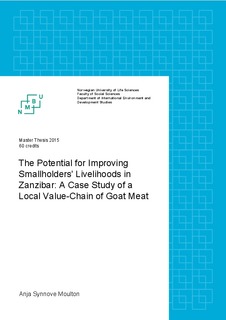| dc.contributor.author | Moulton, Anja | |
| dc.date.accessioned | 2015-11-03T12:49:45Z | |
| dc.date.available | 2015-11-03T12:49:45Z | |
| dc.date.copyright | 2015 | |
| dc.date.issued | 2015-11-03 | |
| dc.identifier.uri | http://hdl.handle.net/11250/2359130 | |
| dc.description.abstract | It is widely agreed that increasing capacity in agriculture and its associated industries
is the most effective way to increase food security and lift people out poverty.
Development organizations and researchers alike now argue that poverty alleviation
depends on smallholder farmers’ ability to transform from subsistence farming to
market-oriented production. Two issues vital to this transformation have emerged;
smallholders’ access to markets and women’s access to resources. I explore these
issues through a case study of a goat meat value chain in Zanzibar.
The case study is a project headed by the Kizimbani Agricultural Training Institute
(KATI) to enhance smallholders ability to access tourist markets in Zanzibar. The
overall objective of my research is to understand, through the case study, how local
farmers can improve their livelihoods. To reach this objective I critically examine
farmers’ potential access to the tourist market and women’s position in goat farming
in Zanzibar. A value chain approach inspired by Kaplinsky and Morris is used to
analyze the opportunities and constraints in the value chain of goat meat. The analysis
is supplemented by mainstreaming gender issues throughout the study, an approach
developed by the Netherland Development Organization. Both qualitative and
quantitative methods were used to collect the necessary data. A survey of 117 farmers
was conducted in Zanzibar in August and September 2014 and further qualitative data
was collected during a field visit in March 2015.
The findings show that women play important roles in dairy goat farming in Zanzibar.
Women have ownership of the goats and receive income from goat products. They are
also active participants in knowledge sharing farmer groups. The study confirms,
however, that women spend substantially more time on household chores than men.
This has implications for women’s participation in upgrading strategies in the value
chain. I argue that upgrading efforts must take into account women’s multiple
responsibilities. My investigation of the value chain of goat meat reveals that the
hotels in question are reluctant to source meat from local suppliers because of
inconsistent supply and poor overall quality. Findings from the study of the proposed
value chain show that the lack of facilitators to oversee and ensure the transaction
between local farmers and hotel and restaurant owners, is a major bottleneck. To
address this issue, I argue that the project leaders must consider an exit strategy in
order to avoid dependency on support from KATI. Based on findings, I suggest
strategies for how the value chain can operate independently. The potential for
smallholder farmers to improve their incomes through the development of a dairy
goat value chain is uncertain in the immediate future. However, my research suggests
dairy goats have the potential to play a significant role in the islands long-term
sustainable development. | nb_NO |
| dc.language.iso | eng | nb_NO |
| dc.publisher | Norwegian University of Life Sciences, Ås | |
| dc.rights | Navngivelse-Ikkekommersiell-IngenBearbeidelse 3.0 Norge | * |
| dc.rights.uri | http://creativecommons.org/licenses/by-nc-nd/3.0/no/ | * |
| dc.subject | Smallholder farmers | nb_NO |
| dc.subject | Value-chain | nb_NO |
| dc.subject | Dairy goats | nb_NO |
| dc.subject | Gender | nb_NO |
| dc.subject | Tourism | nb_NO |
| dc.subject | Zanzibar | nb_NO |
| dc.title | The potential for improving smallholders' livelihoods in Zanzibar : a case study of a local value-chain of goat meat | nb_NO |
| dc.type | Master thesis | nb_NO |
| dc.subject.nsi | VDP::Social science: 200 | nb_NO |
| dc.subject.nsi | VDP::Agriculture and fishery disciplines: 900::Agriculture disciplines: 910 | nb_NO |
| dc.subject.nsi | VDP::Social science: 200::Economics: 210 | nb_NO |
| dc.source.pagenumber | 119 | nb_NO |
| dc.description.localcode | M-DS | nb_NO |

